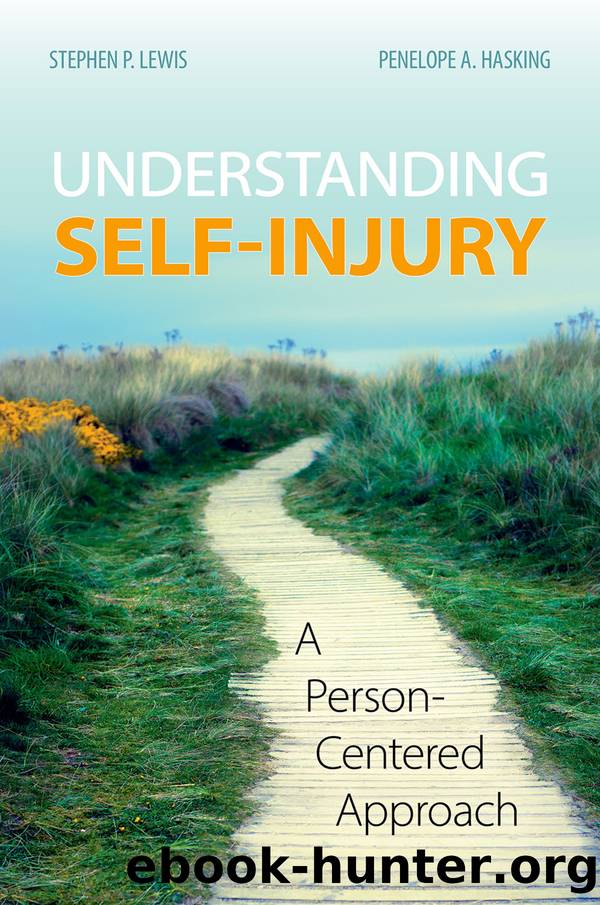Understanding Self-Injury by Lewis Stephen P.;Hasking Penelope A.;

Author:Lewis, Stephen P.;Hasking, Penelope A.;
Language: eng
Format: epub
Publisher: Oxford University Press, Incorporated
Published: 2023-03-15T00:00:00+00:00
Fostering Self-Efficacy
Many people with lived experience report that over the course of recovery, they develop a sense that they can resist acting on urges to hurt themselves when they occur. Such self-efficacy is key for many people in their recovery experience. One part of this involves coming to recognize and accept that thoughts and urges to self-injure may occur ongoingly, as discussed above. Another part of fostering self-efficacy is therefore understanding that it may vary across time, contexts, and across situations.27 For example, someone might find it easier to not act on an urge to self-injure when at work but then experience more difficulty in this regard when home alone at night.28
Although the corpus of evidence in this area is relatively new, there are several studies that support the role of self-efficacy having a role in recovery. As an example, researchers have demonstrated that changes in self-efficacy are linked to stopping self-injury engagement.29,30 Indeed, oneâs efficacy to not act on an urge to self-injure has been shown to coincide with the time since one last injured, with greater self-efficacy associating with a longer time since self-injury engagement.29,30 Data from ecological momentary assessment research has similarly supported the role that self-efficacy can play in safeguarding against self-injury engagement.31
Ultimately, it is important that people develop a sense that they can experience and accept self-injury thoughts and urges and that their presence does not mean they have to hurt themselves. This is especially important as building self-efficacy to resist urges can help to manage and resist future urges to self-injure31 and thus propel recovery efforts. In tandem with this, it is also important that self-efficacy be fostered in terms of drawing on alternate means to avoid self-injury.32 For example, developing a coping repertoire to employ when urges arise may be useful as one could turn to an array of strategies instead of self-injury.
Download
This site does not store any files on its server. We only index and link to content provided by other sites. Please contact the content providers to delete copyright contents if any and email us, we'll remove relevant links or contents immediately.
The Art of Thinking Clearly by Rolf Dobelli(8881)
The 5 Love Languages: The Secret to Love That Lasts by Gary Chapman(8551)
Mindhunter: Inside the FBI's Elite Serial Crime Unit by John E. Douglas & Mark Olshaker(7860)
Becoming Supernatural by Dr. Joe Dispenza(7130)
The Road Less Traveled by M. Scott Peck(6660)
Nudge - Improving Decisions about Health, Wealth, and Happiness by Thaler Sunstein(6651)
Enlightenment Now: The Case for Reason, Science, Humanism, and Progress by Steven Pinker(6423)
Win Bigly by Scott Adams(6334)
Mastermind: How to Think Like Sherlock Holmes by Maria Konnikova(6264)
The Way of Zen by Alan W. Watts(5818)
Factfulness: Ten Reasons We're Wrong About the World – and Why Things Are Better Than You Think by Hans Rosling(4035)
The State of Affairs by Esther Perel(3955)
Gerald's Game by Stephen King(3937)
Man's Search for Meaning by Viktor Frankl(3661)
The Confidence Code by Katty Kay(3580)
Thinking in Bets by Annie Duke(3545)
The Worm at the Core by Sheldon Solomon(2936)
Enlightenment Now by Steven Pinker(2927)
Liar's Poker by Michael Lewis(2824)
